Quick housekeeping: I’m doing a read-along book club type thing. Suggestions on what we should read are welcome. I’m going to try and select something by this coming Friday. Note that unlike normal posts book club announcements will probably not be emailed out, so check manually for updates on it occasionally if you are into that. Not everyone is here for book clubs and I don’t want to be bothersome.
It has been a month and a half since I promised a third entry in this book review series. Like a lot of people, I think it’s good to keep promises. But like literally all people, I’m fallible; I really, really didn’t want to have to read the last 850 pages of this book, back-burnered the entire project, and put it off as long as I could.
I was definitely far enough past this that I was probably just going to forget about it and never do the third entry at all until Astral Codex Ten linked to my article and a bunch of people politely and privately inquired as to when I was going to stop being lazy. So I put my shoulder to the grindstone, bit down on a dowel and proceeded to complete what for me is the reading equivalent of sawing my own leg off.
Whining aside, there are some things you should know about this review. I’m going to cover a lot of the same ground as the first two articles very quickly, then get into what I consider to be the most important aspect but most often forgotten aspect of blogger book reviews: telling you if I think the book is good that you should buy it (Spoiler: I don’t), and telling you what I think the practical/social/philosophical upshots of the book are.
You should also know that I fully admit I got through the last 850 pages as quickly as possible1. Where the first 250 pages were fairly carefully read, the rest of the book was read at a pace somewhere between “fast casual” and “skimming through like it’s the whale anatomy parts of Moby Dick”. It was not careful, involved reading.
The upshot of that reading pace is that someone who carefully read every word (or any particular section) might say I misunderstood some aspect or missed some fine point. And you know what? That’s valid. I don’t think it matters much for reasons I’ll bring up later in the Clarity and Confusion section of this review, but you should adjust your regard for my opinion with that in mind.
The Recap section below is just as advertised, and is a slightly clarified-and-condensed retread of the previous two entries in this series. It’s followed by a section that boldly lets you know whether it’s actually worth it to buy this book, which should be standard in reviews like this but isn’t always. If you are just looking for “new” stuff, feel free to skip or slightly skim to “End of Book Updates”.
The Recap
As previously noted, most of Sadly, Porn revolves around a few base assertions. I’ve expanded the number of entries a little here, but as far as I can tell TLP (The Last Psychiatrist, AKA Edward Teach, i.e. the author of the book) would like you to believe the following:
You are Impotent
TLP doesn’t mean you have erectile dysfunction, but instead that you are unable or unwilling to take actions or principled inaction to get what you want. It’s a bit unclear whether TLP thinks this is because you are a coward, lazy, or for some other reason. Whatever the reason, if you want to go talk to the attractive person at the coffee shop, you can’t/won’t.
You will, however, be aware on some subconscious level that you both wanted to do this and that you never in a million years would actually do so on your own initiative.
You don’t want anything
You are incapable of actually expressing your real desire for anything. TLP alternates a bit on why. sometimes, it’s because you know you won’t act to get it.
Other times it’s because you are ashamed of the things you want in a way TLP attributes to a hazy, indistinct hodge-podge of Freudian concepts of repression and defensiveness. Other times it’s implied wanting something would be an act in and of itself, and he’s already asserted you can’t or won’t act.
Actually, suddenly you can want and act but only in relation to depriving others
Probably the most common word in the book is the various forms of the word “deprive”. In my previous reviews (and reviews by others) you will see a reference to ledger-keeping. TLP’s concept is that you can’t want or act, which means you won’t get anything that satisfies you. In reaction to this, he says, you will both want others to be deprived of satisfaction and take actions to make this happen.
Conservatives often accuse progressives of wanting equality even if that means everyone ends up worse off in absolute terms, and TLP is proposing that something similar is universally driving everything anyone does.
TLP doesn’t think anyone can want anything, but you might think they do; in his telling, if you can provide that thing to them (say, by loving a spouse you think wants to be loved) you will withhold that service to make sure the ledger doesn’t get imbalanced. If they seem to get satisfaction (of any kind, not just sexual) anywhere else, you will either block them from getting it or hurt them in some other way to bring things back to par.
You desire tyranny
Because you can’t act, can’t want, will only act reluctantly to deprive but still desperately want to deprive, TLP says you are also eager for an omnipotent authority of some kind to do all of these things for you. The very specific judgment he’s making is that you want to give your power away and probably already have.
The entity you hand(ed) it off to is only all-powerful in the sense that you convince yourself it is, TLP says. Omnipotence doesn’t exist and competence is rare, but TLP doesn’t think you really care. All you want, he says, is to abdicate your responsibility to anyone who will take it so you can wash your hands of anything and everything that might happen in the future.
The end result is you looking for some outside force to act, to force you to do the things you want to do anyway (which exist for this part of the argument but not elsewhere), you want it to tell you what to want (now you can’t want again) and you want it to act to deprive others (which you can do, but still need the tyrant to do for you). If that seems jumbled, bear in mind it’s not my fault; it’s an 1100 page book written on the back of 10,000 cashed bowls.
Support
Beyond the assertions, TLP supports his arguments by:
Providing his very specific and unusual analysis of various kinds of pop culture
Same as above, but greek plays or histories
Same as above, but the Bible
Asserting something is true of you
Making up examples/stories/jokes wholecloth that are consistent with what he’s saying.
If you are looking for real-life examples or anything that would actually convince someone who doubts his premise, you will be disappointed. TLP isn’t playing that game; he’s asserted something, and now he’s telling you that everything you see can only be interpreted through that lens.
You might think an 1100 page book would deviate from that pattern somewhat; I certainly did. What variety you do get is mostly just in terms of the examples he’s retrofitting to match his worldview. Outside of that limited range of variation, this is essentially a 100-page book he’s written 11 times.
Should you buy this book?
At this point, I want to give people who are just looking for an overall idea of whether they should buy this book an exit ramp from this article. Oddly, I don’t find this is an explicit part of many book reviews in the blogging world, and it’s arguably the entire reason some people read reviews in the first place.
If you are looking for a book to tell you how to improve your life, this book doesn’t really attempt to do that; never is a single solution to a problem directly proposed. You can generalize advice from the problems themselves, but you come out with something like “Spend time identifying what you want and take positive action towards it. Be nicer to people and less selfish. Don’t count on others to achieve your goals.”
You probably recognize this as pretty standard self-help stuff you already know, but if not, I just saved you 20 dollars.
If you are looking for a book that convinces you of a certain worldview, whether or not you should buy this book depends a lot on how you define convincing. This book isn’t data-driven. It’s doesn’t make arguments. TLP is telling you things are a certain way, but if you are the slightest bit skeptical going in he’s not going to do anything to convince you out of that skepticism.
If you are here for writing style and are already a TLP fan, then consider “The Last Psychiatrist blog is to Sadly, Porn as Kevin Smith films are to Kevin Smith films after he discovered weed and had already assumed his own genius unquestionably proven” a reasonable way to set your expectations. If you haven’t read the blog, go read a few posts. This book is that, except with a much lower level of effort-per-word and much, much less of a sense of duty to you as a reader.
In a strictly personal-taste-and-subjective-experience sense, I think it’s raw, untreated garbage. Your mileage may very definitely vary, but I suspect that most people encountering the book without a previously existing positive bias (which, to be fair, he earned) aren’t going to love it either.
The End-of-Book-Updates
This brings us back to the present. Where we left off at page 250, all that plus an erotic cuckolding short story was the entirety of the book. He didn’t seem to be going for anything else, but there was always the chance the book was going to veer off in an unexpected direction; after all, this started out as a book that was supposedly about porn.
As it turns out, there aren’t any huge zig-zags; it’s mostly just the same thing over and over. But a few things did stand out to me and are worth updating on:
Gellman Amnesia and Psychoanalysis
TLP uses a lot of different examples throughout the book. Realistically, most people aren’t going to be intimately familiar with more than a few of them. When you are, it’s easy to spot him cheating by representing some things as clear takeaways that aren’t in the text at all.
The best example of this for most people will probably be his thoughts on The Giving Tree. For reference, he demands you believe that The Giving Tree was all about fostering unhealthy dependence in the boy, as a way to deprive him of his independence. But go look up a PDF of the book and you will notice the boy visits exactly four times between adolescence and death; if he was any more independent China would pay NBC to not talk about him.
Or, Consider:
In both these examples he’s taken a text and said it supports his point. In the first, it doesn’t say what he says it does but maybe we can be ultra-good faith charitable, squint our eyes, and pretend he’s not being dishonest. But in the second example Athenians were so eager to maintain their power and ability to act that they murdered anybody who threatened to take them away, only losing those powers at literal swordpoint, and TLP still says this means they were eager to install a tyrant.
The first point I want to make about this is that the sheer length of the book makes this hard to catch. I was reading the book probably as critically as anyone ever will, and I barely caught these; by the time you’ve read 500 pages or so of this mess, you end up zoning out on anything but the prose.
I don’t know, but I’m guessing for most people this means he gets at least a couple unearned points; it’s easy to forget the one time you caught him playing dirty and assuming he’s walking the straight and narrow on all his other examples.
But it’s hard to believe he wasn’t at least aware of the possibility that people would occasionally catch him and he’s not a dumb person. So why use those examples? The answer is pretty weird and especially weird coming from me, because I’m not about to accuse him of lying. Look at the highlighted section here:
As the book progresses, he starts doing this a lot; he uses Freudian terms to talk about books and movies. Earlier in the book, he spent a lot of time going over accounts of Freud’s psychoanalysis, saying Freud was wrong, and telling you what he actually thinks was going on. And I can’t prove this, but I swear what seems to be happening is that he isn’t analyzing the texts; he’s psychoanalyzing them.
This is important because he’s not just looking for indicators of psychology-relevant stuff in the text; if he was only doing that, you wouldn’t see him coming up with takes on books that aren’t indicated in the text at all. This is something different.
His weird, outdated faith in psychoanalysis makes him think that he’s one of an elite few who can listen to someone recount a dream and pick the right interpretation from the 50,000 plausible explanations of what the dream means. He thinks he can read a book, know what the author’s repressed self was trying to do with the book, what your repressed self is getting out of it.
He’s set up a system by which literally any piece of history or fiction reinforces his point. All that’s required is that he believes he’s magic in a way that lets him reliably pierce through the veil and know all the secret thoughts of the innermost soul, and that what he decides those secret thoughts mean reliably agree with him. Good work if you can get it.
We are all doomed
I mentioned in the “should you buy this book” section that TLP doesn’t really offer advice; he’s talking about a problem, not solutions. But you still find yourself waiting for him to give some guidance at all on avoiding the pitfalls he’s mentioning, since arguably it would be good if you didn’t give dictators fiat powers to deprive your wife of joy, or whatever. But at the end of the book (Spoilers, clearly) you get this:
This is explicitly about Greece, but note the reference to porn here; he’s also talking about you. I’d love to say something clever here, but there’s nothing really to say; at least on a surface level, TLP doesn’t seem to think the problem he’s sure you have is fixable; you are doomed.
The weird part about him taking lunch breaks like he’s the only person who does this
Probably the most bizarre part of the book is when he insults you, shares a recipe for salad, explains that he powerlifts and takes lunch breaks, and then explains that this makes him better than you since you also enjoy concerts, or might be religious. I know this doesn’t make sense, but I want to be really clear again that this isn’t my fault:
Again, no real point here. It’s just a weird break in the book having nothing to do with the rest of the book so he can explain he feels superior to most people and can prove it with salad.
Clarity and Confusion
This is the last section, and then I’m never talking about this book again.
I’ve been talking to several internet friends about this book, but only one (who might do a guest spot giving his impressions of the book as well, at my request, to keep me honest) has actually read it. Said friend and I were talking the other day about the possibility that one or both of us is just reading the book entirely wrong - that it might, in fact, have some deeper meaning we’ve missed.
Between various interpretations we’ve seen on the internet and interpretations we thought of ourselves, we came up with the following potentially incomplete list of things the author was maybe trying to do:
The book is a POWERFUL STIMULUS
Rejecting the book is HELPFUL
DEPRIVING is good if you are DEPRIVING a bad thing
FREE ASSOCIATION gets at hidden truth
ART can't be judged
The first theory says that whatever else might be true, the book elicits strong reactions. We also called it the “Kick the TV” version, since it assumes that some people who read the book are in such a bad place that any change powerful enough to get them to consider changing course is a positive.
The second theory is a more focused version of the first. It guesses that the book is bad on purpose, in order to try to to get you to prove that bastard wrong by doing all the things he says you won’t - loving your spouse, taking positive actions, knowing what you want, etc.
The third is like the second, except in assuming he still believes his deprivation thing and that he can in this one case make your deprivation fetish positive by getting you to deprive him of the satisfaction of being right. In this theory he’s a loophole in your flaws to reflexively fix you forever; the only way to win is for you to be a better person until you either forget about the book or die of old age.
The fourth admits that the book is rambling over-long nonsense but believes there are scattered nuggets of genius in it anyway, that the book must be that way so he can free-associate himself to accidental and occasional genius.
The fifth is something you already know I view to be the defense of all artistic cowards: Saying that something is unjudgeable because it is art, and is thus immune to all criticism or has any obligation to have a meaning at all. I don’t think this is entirely without merit. “I think this is great, screw everyone else” is a fine reason to feel good about enjoying something, and a valid defense for anyone except the author themselves2.
None of these interpretations is impossible. More than one of them are even plausible. But they illustrate a problem, since any five men approaching this mess of an elephant could potentially come to any of these conclusions, blind or not. These aren’t small differences. The entire message of the book changes depending on which one you believe (ditto if you take the book at face value).
The reason this is a problem is because the book itself is such a mess that it’s pretty much impossible to determine which it is. He uses shitty evidence - is that because he’s dishonest, or a psychoanalyst, or because he’s pulling a fast one? He insults you and praises himself - is that to make you reject him, or because he’s an asshole? You can’t know, because the book isn’t written well enough to tell you anything definitive. Whatever it was trying for, the actual effect it will have on the reader is functionally random.
While keeping that in mind, now imagine someone who comes to this book not already agreeing with the author who comes to agree with him by the end of the book. We know he wasn’t convinced by evidence; there wasn’t any the author didn’t either make up whole-cloth or heavily customize to fit his conclusions.
He wasn’t convinced by arguments; TLP doesn’t argue, he asserts. So in the end something else happened; he was either impressed by the author’s identity, entranced by the prose, mesmerized by the endless repetition or cowed into it by insults.
The author never tried to convince him something was true, which we know because he didn’t use any of the tools that did that. He just said something was true and demanded you believe it based on how it was being said and who was saying it. Thus when our friend comes to believe TLP, it’s not because he was convinced; it’s because he accepted TLP as an authority above evidence and argument entirely.
Now, astute readers might at this point note that I’m heavily religious and belong to a religion that heavily emphasizes faith, and that by any reasonable definition I’m someone who accepts “an authority above evidence and argument entirely”. This is a fair objection, but note that when I do that it’s because I genuinely believe the authority in question is an omnipotent deity.
You might think I’m wrong that the deity exists, that’s fine, I’m not trying to convert you. I’m just illustrating a point: a literal omniscient, benevolent god is about what it should take to get you to accept someone as that type of authority. That’s the level TLP is tacitly asking you to put him on. He’s saying he’s a person who doesn’t have to argue or provide proof to convince you.
He’s saying, in 1100 pages worth of words, that things are true not because he can show they are, but because he asserted they are and thus it must be so. If that seems overwrought, ask yourself what else he gave you besides that assertion that should have convinced you. A heavily contorted hot-take on Fast Times at Ridgemont High ain’t it.
If this book sounds entertaining to you, absolutely buy it. If it sounds so bizarre you have to pay him to take a look, I get it; that’s essentially how I got myself into writing this. But if you get to the other end of the ocean of words and find yourself nodding in agreement, please do stop and ask yourself why.
Note also that the writing of this article was fast and loose. I wanted to get this posted as soon as possible, which meant I didn’t inflict it on Editor Nick, who normally cleans up a lot of my errors. This article is not his fault.
This isn’t something that fits well with the rest of the article, but look at this bullshit:
This is in a whole section about how any complaints about his book are invalid, because he warned people about them in the book itself after they had paid for it. Imagine being this big of an asshole, but the context is working at a burger joint.
The customer gets their burger, goes to the table and finds that instead of meat and topping between the bun there’s just a note you left saying “You are too dumb for hamburgers if you have a problem with this”. The customer goes back to the counter to complain and you say “Ask yourself: why do you think I owe you something, just because you paid me? Dumb prole.”
Lest I sound too unreasonable here, there are limits to the kind of demands the customer could make re: burger quality; his $5 does not in fact give him control over the entire menu. But to suggest, as TLP does, that he has no right to complain at all about the horrifying mess of a book TLP only saw fit to warn him about after he had his $20 is basically saying “other people owe me things - I don’t owe anyone anything, since I’m better somehow.”.
Scott’s review noted that this whole section is bizarre, but he declined to make any meaningful judgments on it. Not being Scott, I just want to point out that if this is how you think about the work you produce, you should really just stop writing. It’s turned you into the worst kind of person.



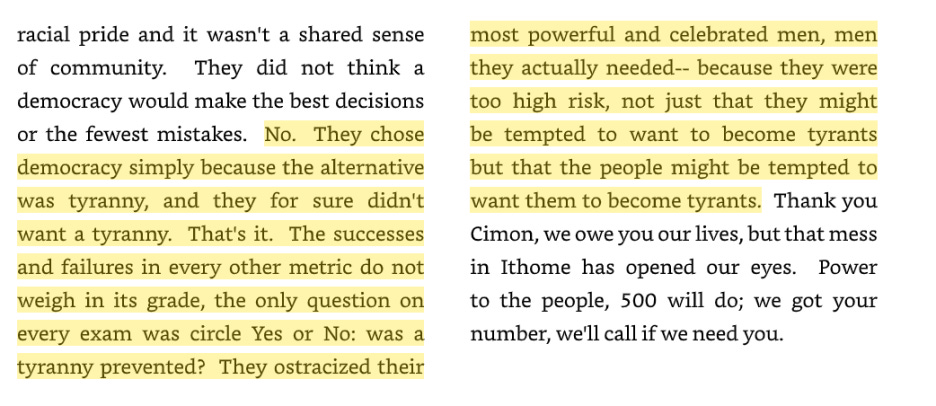
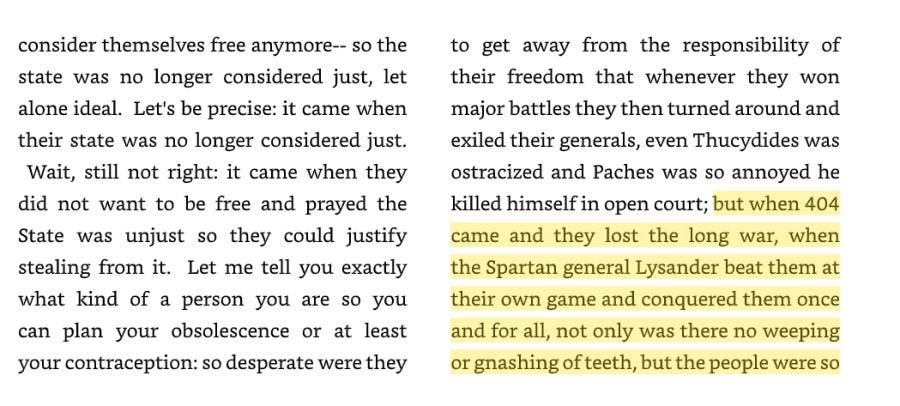
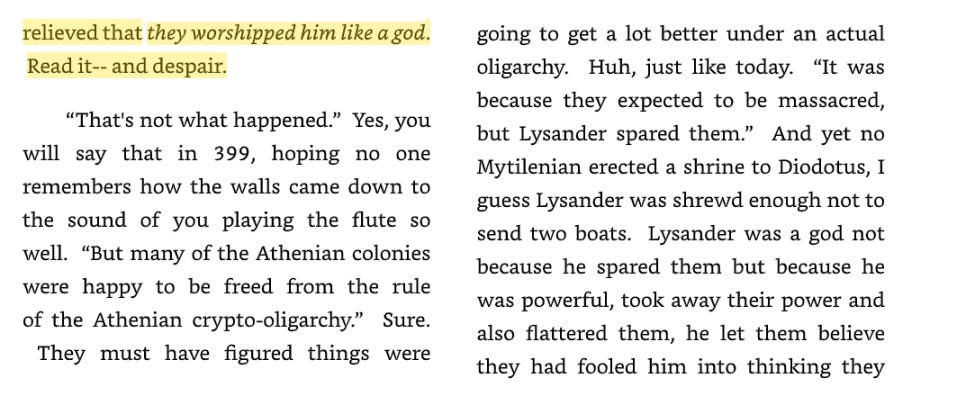
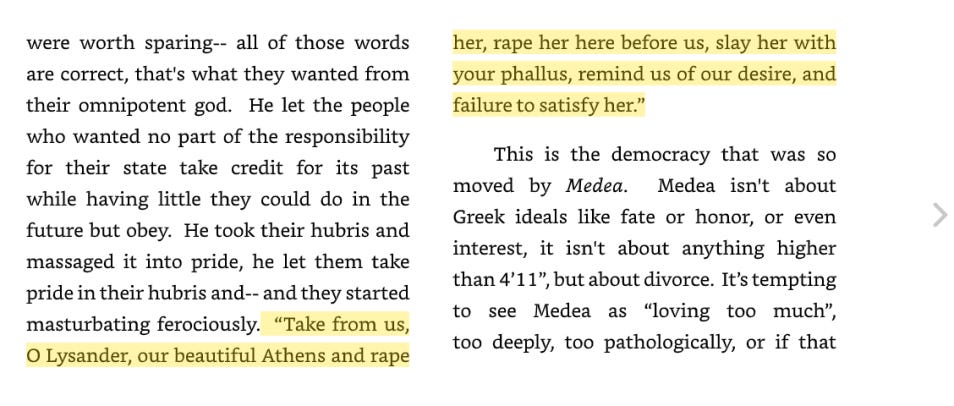
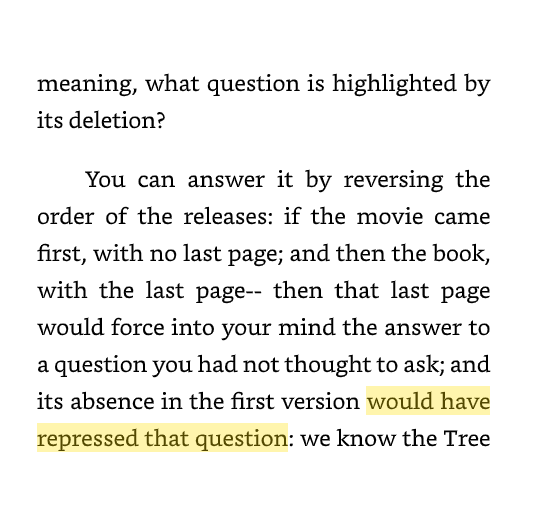
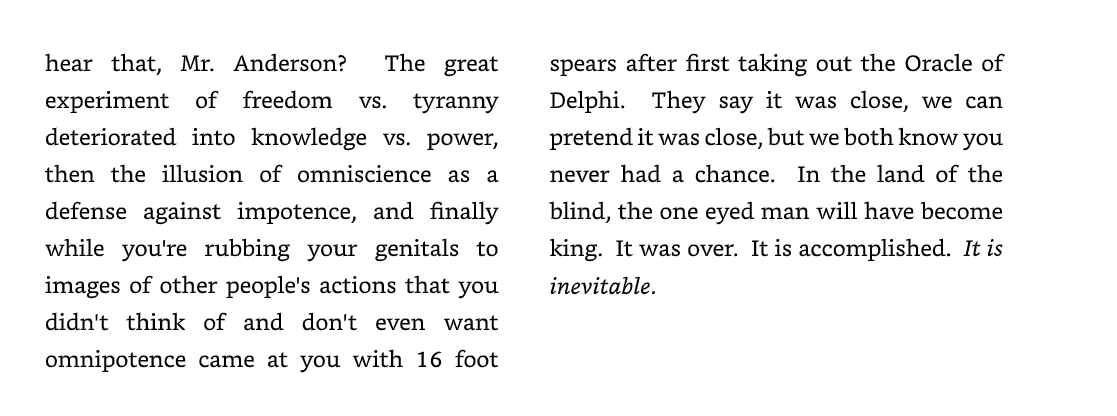


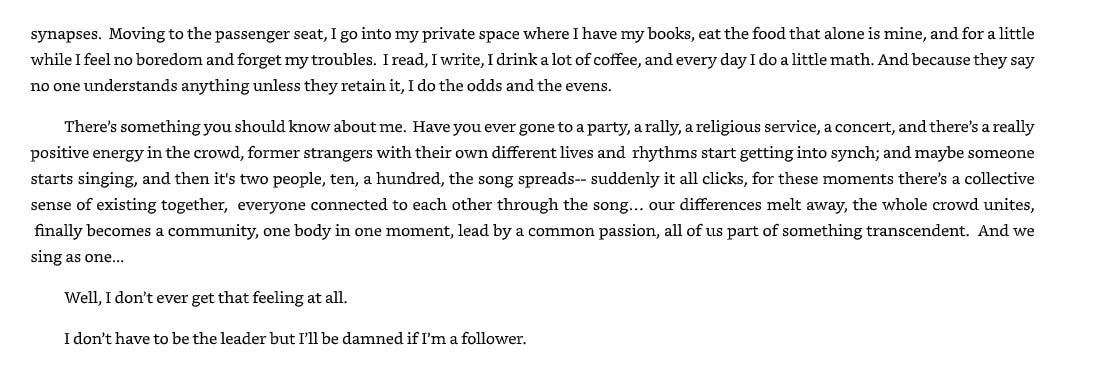

Clearly, the "Astral Codex Ten" guy hates you.
My review of the book in question might be shorter: "Sadly, not porn".
Figured out who Teach reminds me of: Col. Kurtz in Apocalypse Now.